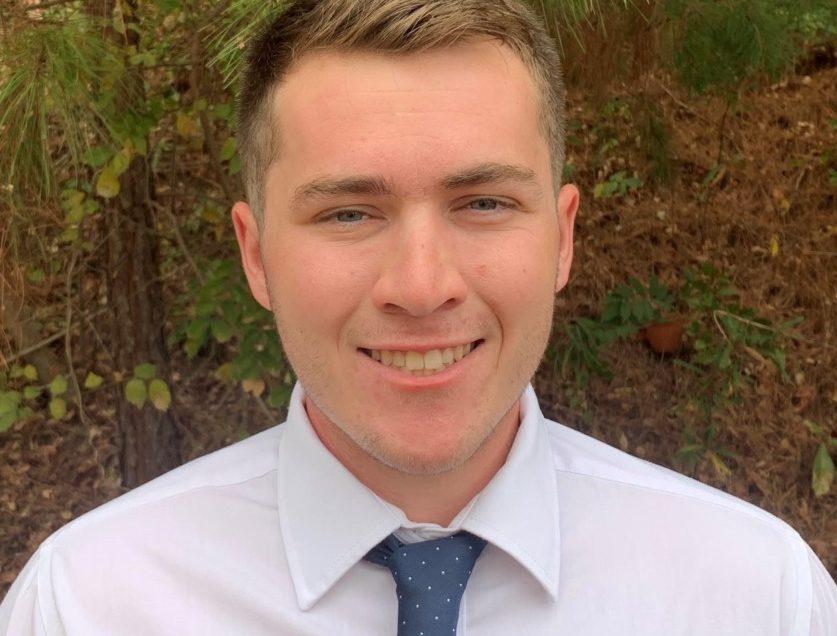CLEMSON – Despite the closure of campus due to COVID-19, the annual Undergraduate Research Initiative Symposium competition in the Clemson University College of Agriculture, Forestry and Life Sciences continued as planned – just under a different format.

The initiative began in 2018 to give students a chance to conduct research under the guidance of faculty mentors and to compete in an oral or poster competition. Because of the campus closure, an optional research abstract competition was held for students this year.
Winners for this year’s competition, by rank, are Garner Powell of Seneca, Brendan MacInnis of Clover and John Nisbet of Irmo.
Powell is a student in the Plant and Environmental Science Department studying under the guidance of Steven Jeffers, a professor of plant pathology. Powell won $300 for his research that involves “Managing phytophthora root and crown rot on lavender using commercially available biocontrol products.” His focus is on possible management strategies, evaluating the effectiveness of biological control products currently available to growers.
“This research will provide growers with information on alternative disease management methods — something that can be used instead of applying chemical fungicides,” Powell said. “The data from this project will demonstrate the potential of these commercially available products to manage Phytophthora root and crown rot on lavender plants.”

Powell said he believes the opportunities afforded him while attending Clemson will prepare him to conduct meaningful research and collect useful data. He plans to attend graduate school and then pursue a job in plant science.
MacInnis is majoring in agricultural mechanization and business studying under the guidance of Bulent Koc, a professor in the Agricultural Sciences Department. He received $200 for his research project, “Effects of ultrasonic cutting on loose and compacted soils.” It involves transmitting high frequency vibrations through a blade to cause a “jack hammer effect” to reduce the amount of force needed to cut in to highly compacted soils.
“We are testing different soil types at different compaction levels, to see how large of a reduction in cutting forces can be achieved,” MacInnis said. “This research is important because it has a lot of applications in the agriculture industry for soil tillage, planting and breaking up hardpans. If ultrasonic vibrations could be adapted to different farming implements, the amount of force needed to operate the equipment could be significantly reduced. This has the potential to help businesses save on fuel, labor and equipment costs.”
Nisbet is a Plant and Environmental Sciences student who won $100 for his research titled, “Evaluation of Armillaria spp, resistance in Prunus interspecific crosses.” His mentor is Ksenija Gasic, a professor of horticulture specializing in peach genetics and breeding.

“My research focuses on Armillaria resistance in peaches,” Nisbet said. “Because the peach is an important agricultural crop, to South Carolina especially, and is being affected nationwide by fungal Armillaria infections, I believe this study supports development of solutions for managing this fungus so that we can help our growers grow more productive crops.”
Armillaria root rot (ARR), also known as oak root rot, is a fungal root disease prematurely killing many stone fruit crops throughout the United States. It is a serious threat to crop production in South Carolina and Georgia on peach, in Michigan on cherry and in California on several stone fruit crops. Currently, ARR is the primary cause of premature peach tree decline in South Carolina and Georgia with an estimated annual loss of 3% to 4% of all peach trees, resulting in approximately $8 million in economic losses every year. With no effective management controls available, formerly productive orchard sites are rendered unsuitable for further production. Given the severity of the ARR threat on multiple Prunus crops, research and extension teams from around the nation are working together to develop both short and long-term solutions to ARR.
Nisbet said the coursework in Clemson’s Plant and Environmental Sciences Department prepared him to look at the Armillaria problem from many angles. It also gave him an understanding of the topic from the fungus in the soil all the way to how it impacts the peach trees’ overall health. After graduating, he plans to earn a graduate degree in plant breeding.
The College of Agriculture, Forestry and Life Sciences launched the Undergraduate Research Initiative to provide students with the opportunity to conduct research under the one-on-one mentorship of a faculty member, said Jean Bertrand, associate dean of undergraduate studies for CAFLS.
“Very few students come to college with exposure to research and we want to make sure we give students an opportunity to explore research as a career path,” Bertrand said. “We need bright, young minds to pursue research and help solve the grand challenges related to food and the environment.”
The undergraduate research initiative is part of a program called CAFLS Advantage, which Bertrand said “is a commitment by the college to provide students with learning experiences beyond the classroom to develop critical thinking skills and prepare them to meet their career goals.”
Other students competing in this year’s competition and their research topics are: Aliute Udoka, an Animal and Veterinary Sciences student from Greensboro, North Carolina , “MicroRNA-192 therapy to reduce lipid content in the ovine adipocyte cell;” Mariah Swygert, an Agriculture Education student from Batesville-Leesville, “Promotion for the Career of Agricultural Education Teachers;” Addie Stone, an Agriculture Business student from Dallas, “The Economic Impact of the H2A Bill in South Carolina;” and Curtis Erwin, an Agricultural Mechanization and Business student from Mooresville, North Carolina, “Forage Sampling Mechanism for Unmanned Ground Vehicle Application.”
For more information, visit https://bit.ly/CAFLS_URI.
-END-
Get in touch and we will connect you with the author or another expert.
Or email us at news@clemson.edu

